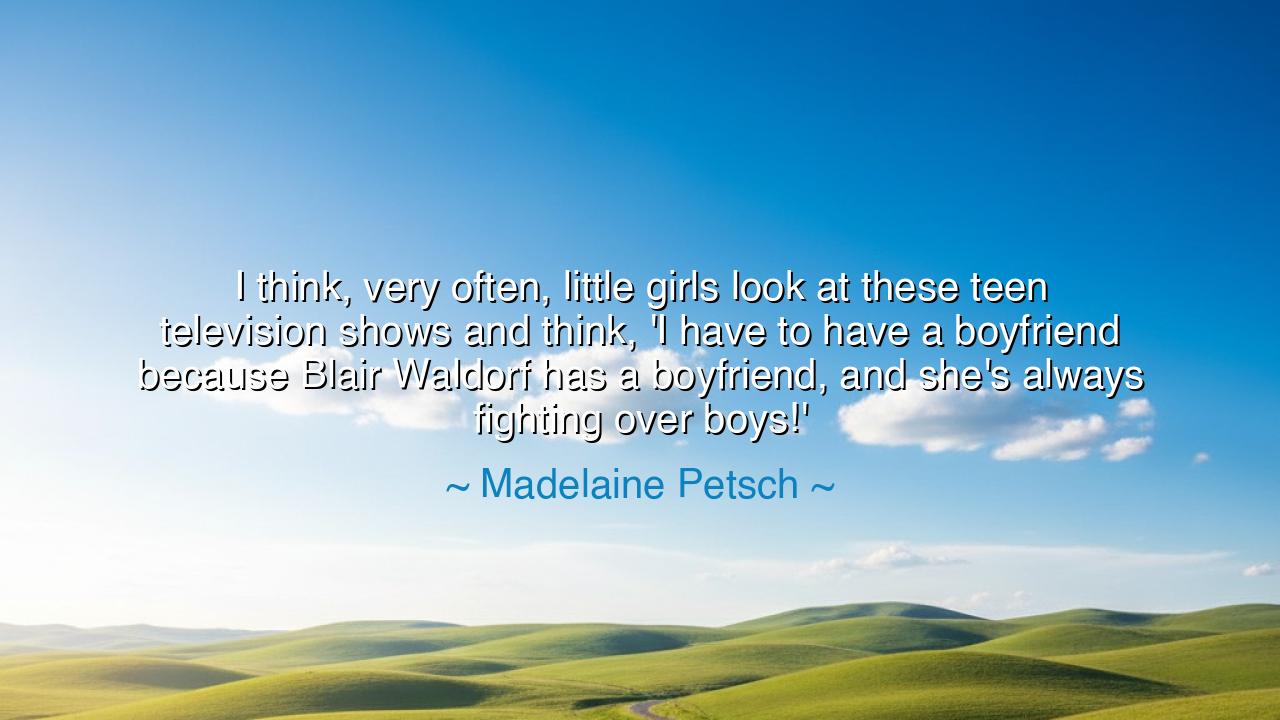
I think, very often, little girls look at these teen television
I think, very often, little girls look at these teen television shows and think, 'I have to have a boyfriend because Blair Waldorf has a boyfriend, and she's always fighting over boys!'






When Madelaine Petsch observed, “I think, very often, little girls look at these teen television shows and think, ‘I have to have a boyfriend because Blair Waldorf has a boyfriend, and she’s always fighting over boys!’” she revealed a truth that runs deeper than gossip or entertainment. She spoke of the hidden power of stories—the way they shape the tender minds of youth, teaching them not only how to speak and dress but how to desire, how to measure their worth, and how to imagine their future selves. Her words are both a warning and a call to awaken: to understand that what the young consume in art becomes the blueprint of who they believe they must be.
The origin of her reflection lies in the cultural force of television dramas like Gossip Girl, where the characters, often glamorous and troubled, become models for identity. A character such as Blair Waldorf, battling for power, recognition, and romance, is no longer just a figure of fiction. For millions of young viewers, she becomes a symbol, a teacher of what life and love should look like. And so, when Blair endlessly fights over boys, little girls learn to equate romance with struggle, conflict, and necessity, rather than choice or joy.
This is no new phenomenon. In ancient times, the myths of gods and heroes shaped the lives of those who listened by the fire. Young boys who heard tales of Achilles or Hercules were taught to see strength and violence as the measures of manhood. Young girls, who listened to the tragedies of Helen or Medea, learned that beauty and love could bring ruin as much as happiness. Just as myths once defined the roles of men and women, so do modern teen television shows—clothed not in the armor of gods but in the designer dresses of Manhattan.
The deeper meaning of Petsch’s words is this: representation teaches expectation. If little girls see women on the screen only fighting over men, they begin to believe their lives, too, must revolve around such battles. They come to measure their worth not by their talents or their spirit but by whether they are chosen, wanted, and claimed. Such lessons, absorbed silently, shape generations. The danger is not in the drama itself, but in the lack of balance—when stories fail to show girls that they can be heroes of their own journeys, leaders of their own battles, dreamers of their own visions.
Yet there is hope, for culture is not fixed—it evolves. Just as once women were denied education until pioneers like Mary Wollstonecraft and Malala Yousafzai defied the norms, so too can television and film evolve to show richer, truer portrayals of women. Petsch herself, in naming this issue, stands in the tradition of those who have sought to widen the lens of storytelling, to ensure that little girls grow up seeing not only Blair Waldorf fighting for boys but women striving for dreams, discovering power, building lives beyond romance.
The lesson here is eternal: guard the stories that shape the young. To parents, artists, and leaders, remember that what children watch, hear, and read becomes their silent inheritance. If they are given only tales of dependence, they will learn to be dependent. If they are given only tales of conflict over love, they will learn to equate love with conflict. But if they are given tales of courage, friendship, wisdom, and independence, they will learn to see themselves as whole, strong, and complete.
Practical wisdom follows. Choose stories carefully, and discuss them openly with the young. When a little girl watches her favorite show, ask her what she thinks of the character, and guide her to see beyond the illusion. Support and celebrate shows that portray women as more than sidekicks in their own lives. And if you are a creator, write boldly—give the next generation of girls and boys stories that affirm the truth: that love is beautiful, but it is not the sum of a woman’s worth.
Thus, Madelaine Petsch’s words are not merely a critique of teen television shows, but a teaching for all ages. They remind us that the images we place before children will echo in their lives for years to come. And so we must pass this wisdom forward: let us give them stories not of narrow roles but of infinite possibility, so that they may grow not only to love, but to lead, to create, and to become the heroes of their own lives.






AAdministratorAdministrator
Welcome, honored guests. Please leave a comment, we will respond soon